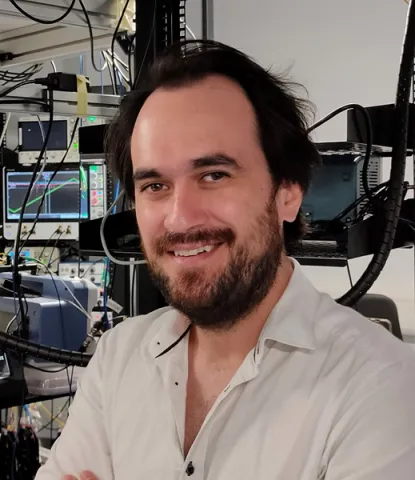About the project
The future Quantum Internet requires coherent transfer of quantum states between disparate platforms. This project develops an alkali-atom-based quantum frequency converter to link trapped-ion quantum processors with telecommunication-wavelength networks. Enabling efficient interfacing between ions and long-distance fiber links is a critical step toward scalable, distributed quantum systems.
Realising future quantum-enhanced technologies, such as the quantum internet will require developing efficient interfaces between quantum processors and telecom fiber networks. Hot alkali vapors offer a low-cost, scalable platform for light-matter interactions that can be implemented at industrial scale (e.g. ORCA Computing). Trapped-ion systems are among the most advanced platforms for quantum computing, offering long coherence times and high-fidelity operations with a strong presence in quantum industry (e.g. Oxford Ionics). However, the photons they emit typically lie in the near-ultraviolet range, making them incompatible with telecommunication networks.
In this project, you will develop and build next-generation rubidium-based quantum frequency convertors and interface them with trapped strontium ions.
As a PhD candidate, you will gain hands-on experience building atomic experimental setups, characterising their performance, and addressing outstanding issues associated with efficiency and noise.
You will also gain experience working with trapped strontium ions through external collaborators, operating ion traps in ultra-high-vacuum environments and using laser systfiber networks, paving the way for global quantum networks.
Within this project, you will have flexibility to follow your interests and determine your own direction of travel.
There will be opportunities to engage with industrial partners and collaborators in the UK and abroad.
The School of Optoelectronics (ORC) is committed to promoting equality, diversity inclusivity as demonstrated by our Athena SWAN award. We welcome all applicants regardless of their gender, ethnicity, disability, sexual orientation or age, and will give full consideration to applicants seeking flexible working patterns and those who have taken a career break. The University has a generous maternity policy, onsite childcare facilities, and offers a range of benefits to help ensure employees’ well-being and work-life balance. The University of Southampton is committed to sustainability and has been awarded the Platinum EcoAward.
